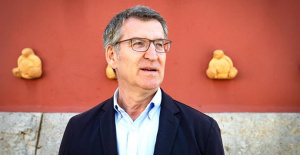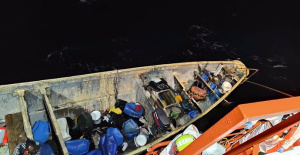MADRID, 14 Feb. (EUROPA PRESS) -
The Government of Turkey has affirmed that it "will not open" the border crossings with the areas controlled by the Kurdish authorities in Syria, amid international efforts to provide aid to those affected by the earthquakes last week in the Turkish province of Kahramanmaras. , located near the border with the Arab country.
"It is out of the question that Turkey is going to open border crossings in places (in Syria) controlled by the Kurdistan Workers' Party (PKK) and the People's Protection Units (YPG)," Turkish Foreign Minister said. Mevlut Cavusoglu, as reported by the Turkish state news agency, Anatolia.
Thus, he stressed that Ankara has informed the United Nations that "they can send humanitarian aid through the two passes under Turkish control." "We have said that we can open these doors to humanitarian aid," he pointed out, before emphasizing the "humanitarian duty to provide aid to the Syrian people after the deadly earthquakes."
Turkey has carried out numerous military campaigns against Kurdish militias in northern Iraq and Syria, including one launched in November against the PKK and the YPG -- main elements of the US-backed Syrian Democratic Forces (SDF). after the November 13 attack in Istanbul, which left six dead and more than 80 injured.
Cavusoglu's words came after Syria opened the Bab al Salam and Al Rai crossings on Monday, on the border with Turkey, for a period of three months, to facilitate the entry of humanitarian aid into the country, as confirmed by the Secretary General of the United Nations, António Guterres.
The earthquakes have so far left more than 36,200 dead, including more than 31,600 on Turkish soil. To this death toll must be added more than 4,500 deaths in Syria, including 1,414 in government-controlled areas and some 3,160 in rebel-held areas in the northwest of the country, according to data from the Syrian Civil Defense, known as 'white helmets'.

 Exploring Cardano: Inner Workings and Advantages of this Cryptocurrency
Exploring Cardano: Inner Workings and Advantages of this Cryptocurrency Seville.- Economy.- Innova.- STSA inaugurates its new painting and sealing hangar in San Pablo, for 18 million
Seville.- Economy.- Innova.- STSA inaugurates its new painting and sealing hangar in San Pablo, for 18 million Innova.- More than 300 volunteers join the Andalucía Compromiso Digital network in one month to facilitate access to ICT
Innova.- More than 300 volunteers join the Andalucía Compromiso Digital network in one month to facilitate access to ICT Innova.-AMP.- Ayesa acquires 51% of Sadiel, which will create new technological engineering products and expand markets
Innova.-AMP.- Ayesa acquires 51% of Sadiel, which will create new technological engineering products and expand markets Milei charges against the Spanish Government in response to some "slander and insults" by Minister Óscar Puente
Milei charges against the Spanish Government in response to some "slander and insults" by Minister Óscar Puente Feijóo, on the UN report: "We are not going to forget either the dictatorship or the terrorist group"
Feijóo, on the UN report: "We are not going to forget either the dictatorship or the terrorist group" A total of 19,887 migrants have arrived in Spain so far this year, 190% more, 15,982 of them in the Canary Islands
A total of 19,887 migrants have arrived in Spain so far this year, 190% more, 15,982 of them in the Canary Islands C-LM, Extremadura or Madrid, among the CC.AA that announce the creation of Bullfighting Awards after the suppression of Culture
C-LM, Extremadura or Madrid, among the CC.AA that announce the creation of Bullfighting Awards after the suppression of Culture How Blockchain in being used to shape the future
How Blockchain in being used to shape the future Not just BTC and ETH: Here Are Some More Interesting Coins Worth Focusing on
Not just BTC and ETH: Here Are Some More Interesting Coins Worth Focusing on Faraday UPV presents the 'Origin' rocket to exceed 10 km of flight: "It is the beginning of the journey to space"
Faraday UPV presents the 'Origin' rocket to exceed 10 km of flight: "It is the beginning of the journey to space" The Generalitat calls for aid worth 4 million to promote innovation projects in municipalities
The Generalitat calls for aid worth 4 million to promote innovation projects in municipalities UPV students design an app that helps improve the ventilation of homes in the face of high temperatures
UPV students design an app that helps improve the ventilation of homes in the face of high temperatures Ivace and promotes a less invasive device for the early detection of prostate cancer
Ivace and promotes a less invasive device for the early detection of prostate cancer A million people demonstrate in France against Macron's pension reform
A million people demonstrate in France against Macron's pension reform Russia launches several missiles against "critical infrastructure" in the city of Zaporizhia
Russia launches several missiles against "critical infrastructure" in the city of Zaporizhia A "procession" remembers the dead of the Calabria shipwreck as bodies continue to wash up on the shore
A "procession" remembers the dead of the Calabria shipwreck as bodies continue to wash up on the shore Prison sentences handed down for three prominent Hong Kong pro-democracy activists
Prison sentences handed down for three prominent Hong Kong pro-democracy activists ETH continues to leave trading platforms, Ethereum balance on exchanges lowest in 3 years
ETH continues to leave trading platforms, Ethereum balance on exchanges lowest in 3 years Investors invest $450 million in Consensys, Ethereum incubator now valued at $7 billion
Investors invest $450 million in Consensys, Ethereum incubator now valued at $7 billion Alchemy Integrates Ethereum L2 Product Starknet to Enhance Web3 Scalability at a Price 100x Lower Than L1 Fees
Alchemy Integrates Ethereum L2 Product Starknet to Enhance Web3 Scalability at a Price 100x Lower Than L1 Fees Mining Report: Bitcoin's Electricity Consumption Declines by 25% in Q1 2022
Mining Report: Bitcoin's Electricity Consumption Declines by 25% in Q1 2022 Oil-to-Bitcoin Mining Firm Crusoe Energy Systems Raised $505 Million
Oil-to-Bitcoin Mining Firm Crusoe Energy Systems Raised $505 Million Microbt reveals the latest Bitcoin mining rigs -- Machines produce up to 126 TH/s with custom 5nm chip design
Microbt reveals the latest Bitcoin mining rigs -- Machines produce up to 126 TH/s with custom 5nm chip design Bitcoin's Mining Difficulty Hits a Lifetime High, With More Than 90% of BTC Supply Issued
Bitcoin's Mining Difficulty Hits a Lifetime High, With More Than 90% of BTC Supply Issued The Biggest Movers are Near, EOS, and RUNE during Friday's Selloff
The Biggest Movers are Near, EOS, and RUNE during Friday's Selloff Global Markets Spooked by a Hawkish Fed and Covid, Stocks and Crypto Gain After Musk Buys Twitter
Global Markets Spooked by a Hawkish Fed and Covid, Stocks and Crypto Gain After Musk Buys Twitter Bitso to offset carbon emissions from the Trading Platform's ERC20, ETH, and BTC Transactions
Bitso to offset carbon emissions from the Trading Platform's ERC20, ETH, and BTC Transactions Draftkings Announces 2022 College Hoops NFT Selection for March Madness
Draftkings Announces 2022 College Hoops NFT Selection for March Madness























